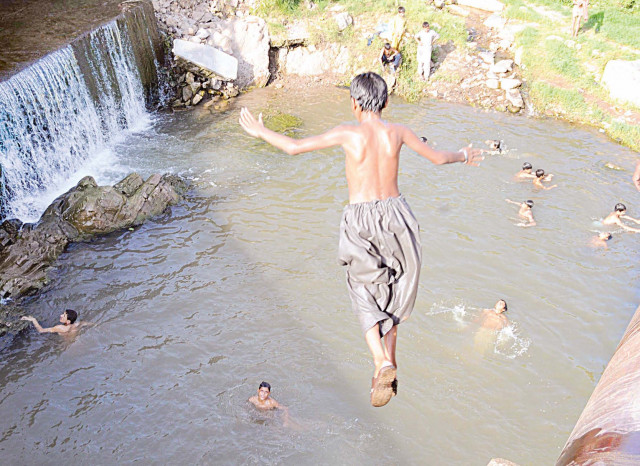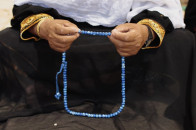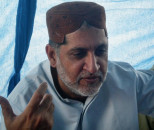In deep waters: The final plunge, a life every summer
Incidents of drowning in springs increase; city administration insists precautionary steps are being taken.

Lost in thought and gazing in to the void, Muhammad Tanvir, a local, sat by the bridge of a stream near Bari Imam where hours ago a youth had drowned after taking a plunge. He narrated the tragic story in a rather carefree manner.
“Oh! He (the young man) climbed that pipe over the stream and dived in where the water was deep. When he did not emerge for over a minute or two, the people nearby fished his body out.” He pointed towards a water pipeline passing horizontally at a height of about 20 feet over the stream, which the young man used as a diving platform.
The stream serves as a source of relief for many others, including children, to beat the scorching heat of summer. Police suspected the young man had hit something solid underwater which caused his immediate death.
“It takes a life every summer. People come here to swim and at least one drowns every year,” said Tanveer, seeming apathetic of the loss or the pain for those who lost their loved ones.
However, this stream is not the only one in the rural areas of Islamabad with a death toll. Different streams (nullahs) in Korang and the Soan are some other points where people went for swimming and drowned recently. Only a couple of weeks ago, two of a family from Rawalpindi drowned in Soan stream where they had gone for a dip.
But officials of the city administration blame the people for their loss. “Warning signs and boards have been affixed at places which could be dangerous especially during the rainy season and people are asked to avoid taking a bath at such places, but they just don’t pay heed,” said Islamabad Deputy Commissioner Amir Ali Ahmad.
However, no such signboards were found at the Bari Imam stream where the young man drowned.
Some people felt that such incidents were avoidable with a little more attention and effort from the city administration, however, the official said it is impossible to fence the entire areas near streams.
“Had there been a warning board telling people that water here was deep no one would have dared to jump into it,” said Muhammad Ajmal, who had come to the stream near Bari Imam to catch fish.
He said that he had been to many streams on the outskirts of the federal capital for fishing and none had a warning signboard, locals concurred. They said that in most cases, people from the city come to such spots to cool themselves off and end up drowning by going into deep waters out of ignorance.
However, DC Ahmed said people need to adopt a responsible attitude and should stop their children from going to streams in the rainy season. He said that adults should take care and not go blindly to swim in streams that they are not familiar with. He insisted that precautionary steps were being taken by the administration.
Published in The Express Tribune, September 15th, 2011.



















COMMENTS
Comments are moderated and generally will be posted if they are on-topic and not abusive.
For more information, please see our Comments FAQ